
Germany 1985, RDF 1985, Baltic 1985 and Norway 1985 by Roger Keating, published by SSI
First release :
Germany 1985 : November 1982
RDF 1985 : March 1983
Baltic 1985 : July 1984
Norway 1985 : September 1985
Tested on : AppleWin emulator
Total time tested : Around 30 hours
Average duration of a campaign: 4 to 6 hours depending on the game
Complexity: Complex (4/5) except Norway 1985 which is medium (2/5).
Would recommend to a modern player : No
Would recommend to a designer : Yes, for the impact of seeing and being seen
Final Rating: “Still interesting” for the best ones (Germany 1985 and Baltic 1985)
Ranking at the time of review :
Germany 1985 : 8/79
RDF 1985 : 14/79
Baltic 1985 : 9/79
Norway 1985 : 19/79
The Superpowers Collides series (aka the 1985 series) are the last four Roger Keating games published by SSI, with the sole exception of a Reach for the Stars remaster in 2000. Keating doesn’t have fond memories of the series : back in September 2021 when I was chatting with him about earlier games, he warned me that they were disappointing games (“a rip off of Southern Command”), adding “if you skip the ’85 games I will forgive you !“
After completing Operation Apocalypse (released March 1981), Keating returned to Australia and signed a contract for one more game, Southern Command. Its development was challenging, as Keating decided to switch from BASIC to Assembler and had to send the game to California for review via snail mail. Despite the difficulties, the final product was released in November 1981. Its quality exceeded Joel Billings’ expectations and resulted in a contract for four more games which were to be linked thematically.
However, Keating found out that four games were two games too many. The first two games went smoothly. Germany 1985 took some time (released in November 1982, one year after Southern Command) but RDF 1985 could be released soon thereafter in March 1983, as it was effectively a scenario pack (same ruleset and only one map). Things still went smoothly enough that Keating had time to change the ruleset for air support, including in Germany 1985 thanks to v2.0 version. Billings even announced on RDF 1985‘s release that there would be a fifth instalment in the series : a scenario editor.

Optimism would not last for much longer. Keating had committed to various other projects : he had instigated the New South Wales Computer Education Group, which helped schools all around the State, and he was also Australian Director of International Apple Corps. The latter involved four trips a year to the United States – time-consuming but also absolutely necessary (in before-internet times) to break his Australian isolation, keep in touch with key people and remain updated on the latest tech and industry good practices. What he learned, he applied to his games but also passed it on to the Sydney Apple Users Group, of which he was still an active member. Keating was a workaholic, so it was manageable, at least until the birth of his first son in June 1982. In addition to the obvious time sink investment of raising a child, this may have led Keating to reevaluate the financial side of things, and realize that he was not making enough money developing games for SSI. That’s when Ian Trout entered Keating’s life, a story I already recounted in my Reach for the Stars article. By the time the real work started on Reach for the Stars, RDF 1985 had been finished, but there were two more games to make. And, it turns out, a Commodore 64 port that had somehow appeared on the to-do list.
In 1983, Ian Trout was still more a business partner than a friend, and he declined to help Keating on the 1985 series. It was Keating’s problem, not Trout’s ! Keating worked day & night on three projects at the same time : SSG (whether Reach for the Stars or Carriers at War), the C64 port and Baltic 1985. But this was not enough – Keating had to delegate a significant part of Baltic 1985 to Philip Bradley, a former QA-tester turned into what was then called a (free) “game developer”, something we would call “game producer” nowadays. Eventually, the C64 versions of Germany and RDF were released in February 1984 and Baltic 1985 in July 1984.
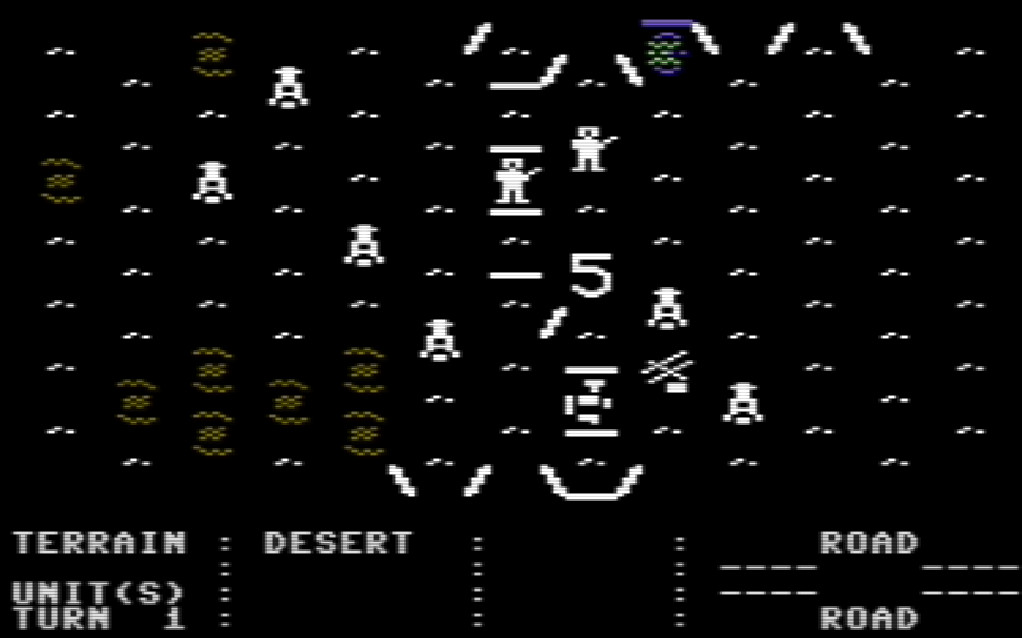
It left Keating with one final game to develop. SSG kept him as busy as ever, but a final event turned Norway 1985 into the final boss of the series : the birth of his daughter in July 1984. With absolutely no time to allocate to the project, Keating appointed Bradley as designer in addition to producer. As I explained in my Norway 1985 AAR, the two of them cut down the features of the game to a shell of what the earlier games had. It worked, and Norway 1985 was finally released in September 1985, bringing the When Superpowers Collide series to a close.
Germany 1985 was sold for the standard $59.95 SSI high price point, and the three other stand-alone scenarios for $34.95 each. Let’s see if it was worth the price !
A. Immersion
Poor. Not a strength of the series. Germany 1985 does not give you any context, and the other games only allocate a few lines to their own context, and they need some serious suspension of disbelief for RDF 1985 and Baltic 1985. In RDF 1985, the Soviets somehow managed to land paratroopers by surprise in Saudi Arabia and then airlift several brigades worth of tanks. Had the Soviets tried that trick in reality, I suspect that all their elite troops would have been destroyed in the air, or at best soon after touching ground, and then the 1985-equivalent of Reddit would have made the 1985-equivalent of VDV memes for the rest of the war.

Graphics did not age too poorly for a series that is 40 years old, but the modern gamer ought to turn the volume off.
B. UI , Clarity of rules and outcomes
Poor. I could copy almost word for word what I said more than one year ago about Southern Command. Actually, I will start by doing exactly that, with two major problems that are still there :
- your hidden units also being hidden to you
- the lack of feedback on combat results – all the more frustrating since you could theoretically calculate it yourself with the manual except for the random factor – so why hide it ?
Of course, the 1985 series also has the same strengths : the game is fast, the documentation is well-done.
Now, the significant difference with Southern Command is that the game is even more complex, cluttering the UI with almost a dozen of new commands you are not going to use. Some are just too tricky to use :
- “Delay”, which allows you to move/attack during the enemy turn according to specific conditions – even the AI barely uses it,
- “Exit”, which allows your unit to leave the map to return reorganized a few turns later. The AI does not use it at all,
Other commands just automatize something that does not need automatizing, for instance “Run and Reorganize” does the same thing as you manually moving your unit and then reorganizing it – except you have no idea where your unit is going to run.

But of course, the most complex part of the game is in trying to understand the combat system. It takes into account even more factors than its predecessor (HQ ! number of units seeing ! support mode ! ) :
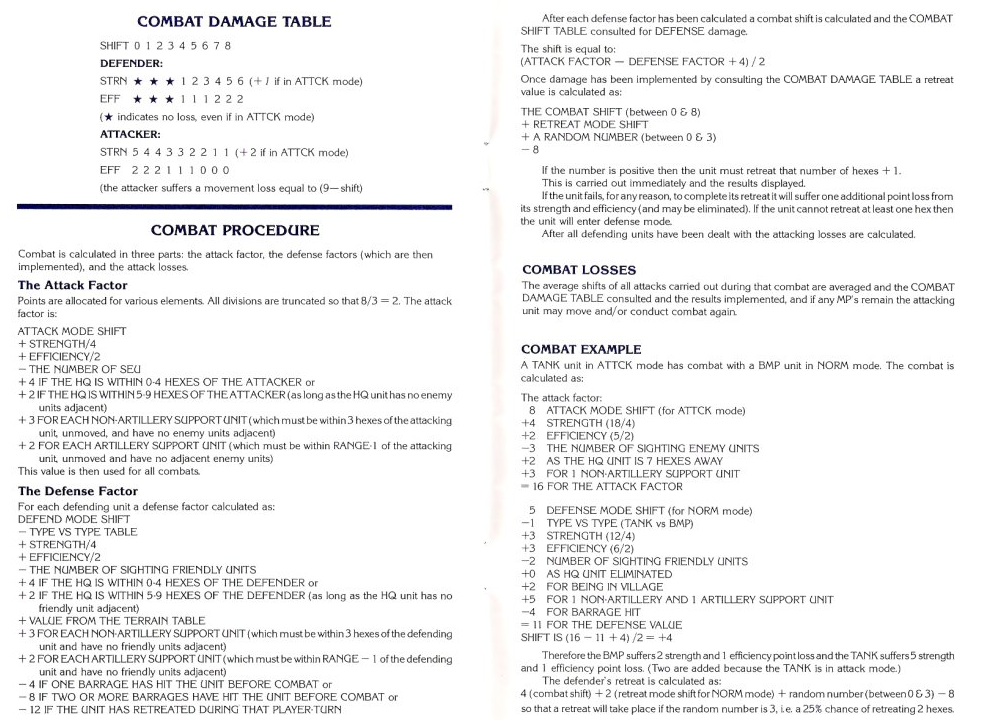
Eventually, by Baltic 1985 I got used to it and could feel the game, but the game lacks a way to predict combat results better.
C. Systems
Good. The 1985 series builds up on Southern Command, which built up on Operation Apocalypse, which built up on [Computer] Conflict. The result is a complex but deep game.
I am just going to list the changes compared to Southern Command :
- The most impactful change is of course the fact that the number of enemy units seeing a unit linearly decreases its speed and its combat capacity. This works wonderfully : a single well-positioned unit can slow down an entire column, and while units are otherwise relatively fast when using a road, they are hard to disengage from melee. In large battles, the direct bonus afforded by terrain is dwarfed by the bonus offered by being hard to see. A large force entrenched in a city or a forest (sighted at a maximum range of 2) surrounded by open terrain (sighted at a maximum range of 5) is almost impossible to attack without the support of smoke or the cover of the night.
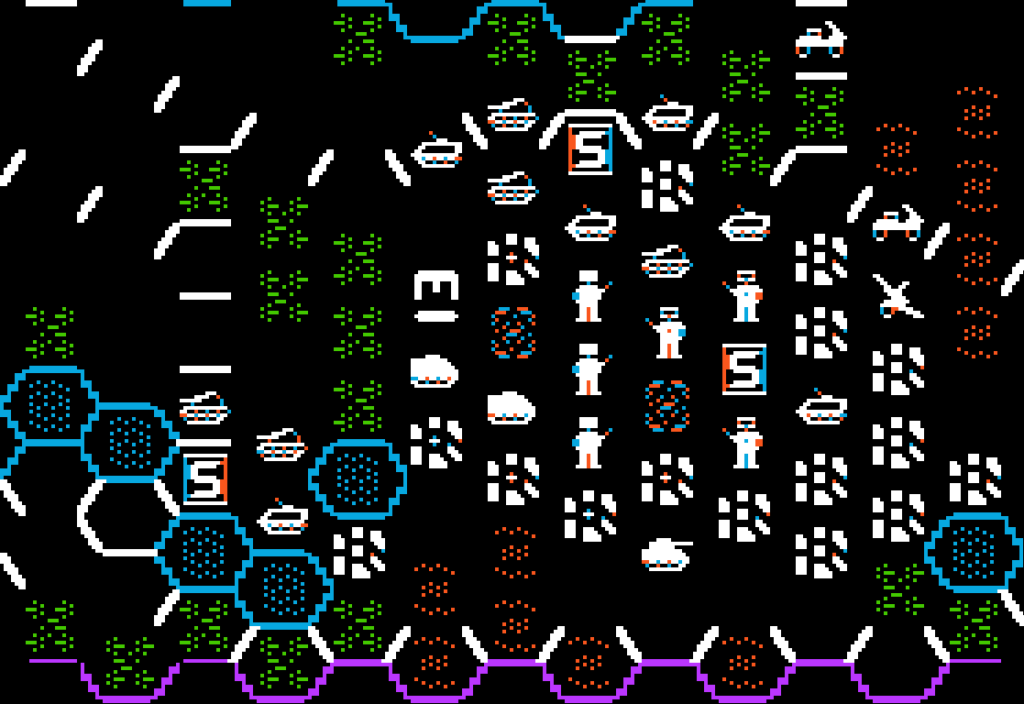
- Air support is a weird one. The first edition of Germany 1985 initially changed how air support worked compared to Southern Command, with a needlessly complex system where you had to call air support on an area one turn and only trigger the strikes the following turn. RDF 1985 rolled back to Southern Command‘s simpler system (without the SAM sites and with a lot more strikes) where the strikes happen on demand.
Before striking anything though, the player must now acquire air superiority by investing a rolling pool of air assets points. Investing those points gives air superiority points 2 turns later, the air assets points returning to the player after a random time.

- Finally, the 1985 series adds divisions and HQ units. Units close to their divisional HQ fight better and heal (“reorganize”) faster. Unfortunately, the HQ units themselves fight worse but look exactly the same as normal units, so I am mixed about this feature. It is even worse for the Soviet player, as Soviet artillery can only shoot at targets within sight of units of the same division ; maybe realistic, but also frustrating given the UI limitations of the game.
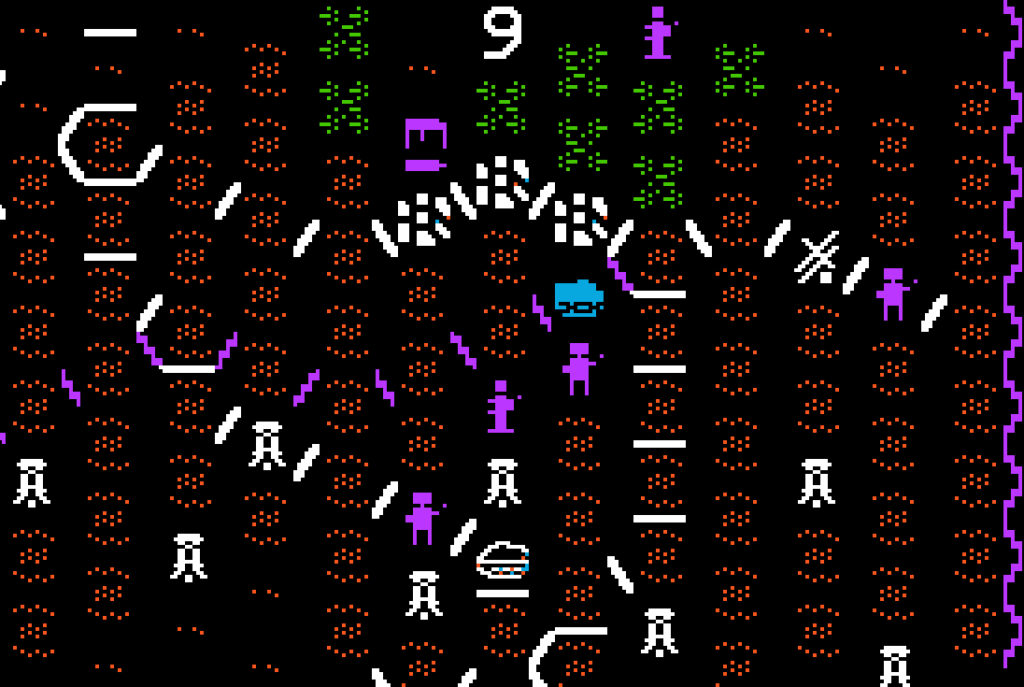
Norway 1985 uses a simplified system, but I don’t think it works well for reasons I explained in my AAR. It would be ranked “average”.
D. Scenario design & Balancing
Good, but game-dependent. Germany 1985 is probably the best from this point of view, with 2 scenarios and a terrain that can be randomized. Baltic 1985 comes close second – the scenario is the best one of the series, but there’s only one and no randomization. I find the RDF 1985 scenario much weaker, as the map is mostly variations of desert, with a maximum sighting range of either 2 or 3 everywhere because that’s the dune-kind of desert, not the flat one. It also felt unbalanced in favour of NATO. The Norway 1985 scenario is good, not quite Germany 1985 level but really my issue with that opus is the ruleset.
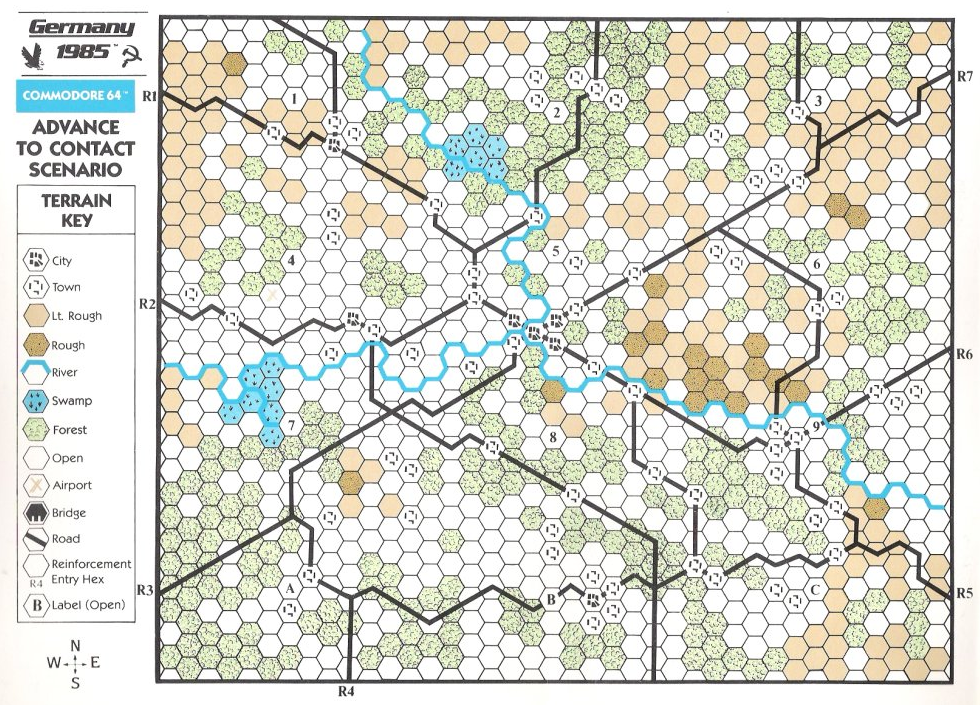
As for the AI, Keating told me that “the purpose of AI is to give someone a good game then possibly lose“. By this criteria the AI of the series is close to perfect : it is really good, but it still lost. While I won my four AARs, I had to train a lot in Germany 1985, and even today I don’t know many open hexagon-based games where the AI is challenging without an overwhelming numeric superiority (looking at you Panzer General & clones).
The sole exception is once again Norway 1985, where the AI plays as if it was fighting according to the old ruleset and gets easily destroyed.
E. Did I make interesting decisions ?
Yes, every turn, both strategic and tactical, in all four games.
F. Final rating
Germany 1985 and Baltic 1985 are still interesting, and I rank them at the same level as Southern Command (the ruleset is better, but the Southern Command scenario was one of the best I had ever seen). RDF 1985 and Norway 1985 are well-designed but obsolete, the former has a dull scenario that does not leverage the ruleset, and the latter cut the features that made the 1985 series so special.
All those games are complex to get into – it takes hours to “get” the game – so as interesting as the games are I cannot really recommend them.
Contemporary Reviews
With 4 games released over 4 years, there are a lot of reviews for the series, in particular after the C64 releases. Those many reviews are unanimous, and articulate at least for the first 3 games around two messages :
- they are some of the best wargames on the market, but
- they are not for everyone.
To take two representative examples:
- Jay Selover writing for Computer Gaming World in December 1984 : “Germany 1985 represented the state-of-the-art in computer wargames when it first came out; and [the later games] are still leaders in player options, graphics, and speed of program execution. […] The best thing about the combat system is that it takes into account the many external factors which do influence combat. The worst thing about the combat system is the same thing”.
- Brian Murphy writing for Creative Computing in September 1983 : “Germany 1985 and RDF 1985 are not right for first-time wargamers. Even experienced wargame buffs would be well advised not to take them lightly. Once you have mastered the game system, however, you are in for one of the most formidable wargame challenges you are likely to experience“
The automatization system, which I found useless and cluttering, was praised by all the reviewers who mentioned it. The Creative Computing review above says Germany 1985 “comes closer than any other wargames I have seen to being fully automatic […] This takes much of the work out of wargaming“. Several other magazines call the feature nothing less than “outstanding”. I suspect some of those reviewers found the game so hard because they used that feature !
In France, the series earned universal acclaim.
- In March 1983, the short-lived Micro 7 magazine claims the game is “sufficiently interesting to keep you awake from 8 PM to 8 AM“, but of course, being French, it complains that the air rules are too simplified and at the same time that turns are too long. In the same issue, it says Southern Command was the best wargame on the market… before Germany 1985 was released.
- In June 1983, Casus Belli explains Germany 1985 “uses the power of the computer to offer a wargame of a depth never reached by tabletop games“
- One year later in March 1984, Germany 1985 and RDF 1985 are the only games to receive 6 stars in Tilt‘s March 1984 retrospective on wargames (30 games covered). In December of the same year, Germany 1985 received the “Tilt d’Or” of best wargame on the market.
Similarly, the British Zzap!64 still rated Germany 1985 at 97% in March 86, 3 and a half years after its initial release !
The same was a success, with more than 12 000 copies sold in the USA for Germany, and a comparable number for RDF and Baltic together. Norway had more mediocre sales.

I am a bit sad to be finished with the series, and we are done with Keating until Carriers at War, but between Sid Meier’s NATO Commander and Gary Grigsby’s Reforger ’88 we are going to see a lot more games about the Cold War gone hot.